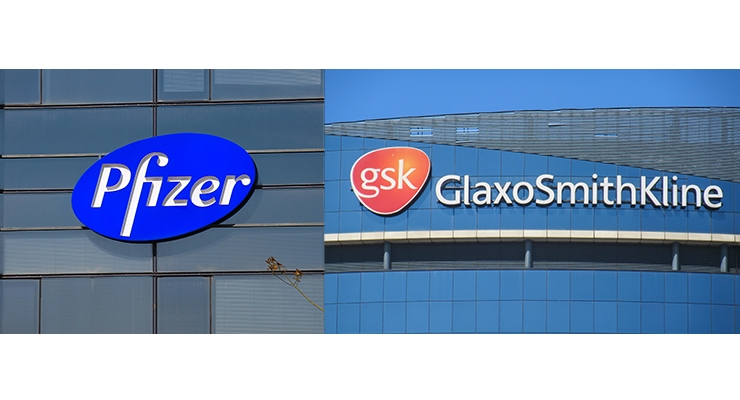12.19.18
Pfizer Inc. and GlaxoSmithKline plc have entered into an agreement to create a premier global consumer healthcare company. The Boards of Directors of both companies have unanimously approved the transaction under which Pfizer will contribute its consumer healthcare business to GlaxoSmithKline’s existing consumer healthcare business. The 2017 global sales for the combined business were approximately $12.7 billion.
Matthew Oster, head of consumer health at Euromonitor International, commented on the joint venture, and discussed how the new business would represent the world’s largest consumer health company by far, with around 6% of the global market.
“This deal makes sense on a number of fronts,” noted Mr. Oster. “It brings together a number of global megabrands under one roof, from GSK’s Panadol and Voltaren to Pfizer’s Advil, Centrum and Nexium; together the company will house 25 consumer health brands with more than $100 million in annual retail sales. It also marks a logical end to the rumors about Pfizer’s underperforming consumer health division, which had been reported to be on the block off-and-on for the last couple years. GSK has the capacity to take on a joint venture of this magnitude, as its 2015 JV of Novartis’s consumer health division proved (GSK bought out Novartis’s share of this joint venture earlier this year). GSK has also been able to show steady growth in a consumer health marketplace where many of the leading players, like Pfizer, have seen recent difficulties. It also makes sense in terms of the new company’s geographic portfolio, with Pfizer’s well-built presence in the U.S. complementing GSK’s leading position in Western and Eastern Europe and the Middle East and Africa.”
Additionally, Mr. Oster stressed the joint venture will expand GSK’s consumer health portfolio from pure OTC toward the faster-growing vitamins and dietary supplements categories. He suggested “Pfizer plays more actively [in the supplements category] (with megabrands such as Centrum, Caltrate, Emergen-C and Vitasprint); more than half of Pfizer’s global consumer health sales come in the form of vitamins and dietary supplements, while 95% of GSK’s consumer health sales fall in OTC. This will allow the new merged company take advantage of changing consumer trends around healthy living that are driving interest in vitamins and dietary supplements and will give them a competitive boost in diversifying away from a pure OTC portfolio.”
Commenting on the deal, Ian Read, chairman and current chief executive officer for Pfizer stated: “We are pleased to announce this new joint venture for Pfizer Consumer Healthcare, delivering on our commitment to complete the strategic review for this business in 2018. Pfizer and GSK have an excellent track record of creating successful collaborations, and we look forward to working together again to unlock the potential of our combined consumer healthcare businesses.”
Under the terms of the transaction, Pfizer will receive a 32% equity stake in the joint venture, entitling Pfizer to its pro rata share of the joint venture’s earnings and dividends, which will be paid on a quarterly basis. Pfizer will have the right to appoint three out of the nine members of the joint venture’s board. The transaction is expected to deliver $650 million in peak cost synergies and to be slightly accretive for Pfizer in each of the first three years after the close of the transaction, which is anticipated during the second half of 2019, subject to receipt of GSK shareholder approval and regulatory approvals, and satisfaction of other customary closing conditions.
As Pfizer will own less than 50% of the joint venture, Pfizer anticipates deconsolidating Pfizer Consumer Healthcare from its financial statements following the closing of the transaction. In the near- to medium-term, this deconsolidation is not expected to have a material impact on Pfizer’s top-line growth. In addition, given the Consumer Healthcare business records lower margins than Pfizer’s other businesses, the deconsolidation is expected to have a slight positive impact on Pfizer’s operating margins over the next several years.
Following the integration of the combined business, GSK intends to separate the joint venture as an independent company via a demerger of its equity interest to its shareholders and a listing of the Consumer Healthcare business on the UK equity market. GSK will have the sole right to decide whether and when to initiate a separation and listing for a period of five years from closing of the proposed transaction. GSK may also sell all or part of its stake in the joint venture in a contemporaneous IPO.
Should a separation and listing occur during the first five years after closing, Pfizer has the option to participate through the distribution of its equity interest in the joint venture to its shareholders or the sale of its equity interest in a contemporaneous IPO. After the fifth anniversary of the closing of the proposed transaction, both GSK and Pfizer will have the right to decide whether and when to initiate a separation and public listing of the joint venture.
“The combination of these leading businesses with distinct regional and category strengths will be more sustainable and broader in scope than either company individually,” said Albert Bourla, chief operating officer and incoming chief executive officer, Pfizer. “We believe that this joint venture is a great opportunity to ensure the future success of Pfizer Consumer Healthcare while unlocking meaningful after-tax value for Pfizer shareholders.”
The companies suggested the joint venture will be a category leader in pain relief, respiratory, vitamin and mineral supplements, digestive health, skin health and therapeutic oral health and will be the largest global consumer healthcare business. In addition, the joint venture is expected to be the first or second largest consumer healthcare player in key geographies, including the U.S., Europe, China, India and Australasia. The joint venture will operate globally under the GSK Consumer Healthcare name.
Emma Walmsley, GSK CEO, will be chair of the new joint venture. Brian McNamara, currently CEO GSK Consumer Healthcare, will be CEO of the new joint venture and Tobias Hestler, currently CFO GSK Consumer Healthcare, will be CFO.
Until separation, the joint venture will be consolidated in GSK’s financial statements. For the year ended December 31, 2017, the Pfizer Consumer Healthcare business recorded revenues of approximately $3.5 billion and the GSK Consumer Healthcare business recorded revenues of approximately $9.2 billion.
GSK has agreed to pay a break fee of $900 million if (i) the GSK Board of Directors changes, withdraws or qualifies its recommendation of the transaction to its shareholders for approval; (ii) GSK’s shareholders vote on the proposed transaction and do not approve it; or (iii) GSK’s shareholders do not approve the proposed transaction by September 30, 2019 (subject to extension in certain circumstances).
Centerview Partners LLC, Guggenheim Securities, LLC and Morgan Stanley & Co. LLC served as Pfizer’s financial advisors, Wachtell, Lipton, Rosen & Katz, and Clifford Chance LLP served as its legal advisors, and Skadden, Arps, Slate, Meagher & Flom LLP served as its tax advisor.
Matthew Oster, head of consumer health at Euromonitor International, commented on the joint venture, and discussed how the new business would represent the world’s largest consumer health company by far, with around 6% of the global market.
“This deal makes sense on a number of fronts,” noted Mr. Oster. “It brings together a number of global megabrands under one roof, from GSK’s Panadol and Voltaren to Pfizer’s Advil, Centrum and Nexium; together the company will house 25 consumer health brands with more than $100 million in annual retail sales. It also marks a logical end to the rumors about Pfizer’s underperforming consumer health division, which had been reported to be on the block off-and-on for the last couple years. GSK has the capacity to take on a joint venture of this magnitude, as its 2015 JV of Novartis’s consumer health division proved (GSK bought out Novartis’s share of this joint venture earlier this year). GSK has also been able to show steady growth in a consumer health marketplace where many of the leading players, like Pfizer, have seen recent difficulties. It also makes sense in terms of the new company’s geographic portfolio, with Pfizer’s well-built presence in the U.S. complementing GSK’s leading position in Western and Eastern Europe and the Middle East and Africa.”
Additionally, Mr. Oster stressed the joint venture will expand GSK’s consumer health portfolio from pure OTC toward the faster-growing vitamins and dietary supplements categories. He suggested “Pfizer plays more actively [in the supplements category] (with megabrands such as Centrum, Caltrate, Emergen-C and Vitasprint); more than half of Pfizer’s global consumer health sales come in the form of vitamins and dietary supplements, while 95% of GSK’s consumer health sales fall in OTC. This will allow the new merged company take advantage of changing consumer trends around healthy living that are driving interest in vitamins and dietary supplements and will give them a competitive boost in diversifying away from a pure OTC portfolio.”
Commenting on the deal, Ian Read, chairman and current chief executive officer for Pfizer stated: “We are pleased to announce this new joint venture for Pfizer Consumer Healthcare, delivering on our commitment to complete the strategic review for this business in 2018. Pfizer and GSK have an excellent track record of creating successful collaborations, and we look forward to working together again to unlock the potential of our combined consumer healthcare businesses.”
Under the terms of the transaction, Pfizer will receive a 32% equity stake in the joint venture, entitling Pfizer to its pro rata share of the joint venture’s earnings and dividends, which will be paid on a quarterly basis. Pfizer will have the right to appoint three out of the nine members of the joint venture’s board. The transaction is expected to deliver $650 million in peak cost synergies and to be slightly accretive for Pfizer in each of the first three years after the close of the transaction, which is anticipated during the second half of 2019, subject to receipt of GSK shareholder approval and regulatory approvals, and satisfaction of other customary closing conditions.
As Pfizer will own less than 50% of the joint venture, Pfizer anticipates deconsolidating Pfizer Consumer Healthcare from its financial statements following the closing of the transaction. In the near- to medium-term, this deconsolidation is not expected to have a material impact on Pfizer’s top-line growth. In addition, given the Consumer Healthcare business records lower margins than Pfizer’s other businesses, the deconsolidation is expected to have a slight positive impact on Pfizer’s operating margins over the next several years.
Following the integration of the combined business, GSK intends to separate the joint venture as an independent company via a demerger of its equity interest to its shareholders and a listing of the Consumer Healthcare business on the UK equity market. GSK will have the sole right to decide whether and when to initiate a separation and listing for a period of five years from closing of the proposed transaction. GSK may also sell all or part of its stake in the joint venture in a contemporaneous IPO.
Should a separation and listing occur during the first five years after closing, Pfizer has the option to participate through the distribution of its equity interest in the joint venture to its shareholders or the sale of its equity interest in a contemporaneous IPO. After the fifth anniversary of the closing of the proposed transaction, both GSK and Pfizer will have the right to decide whether and when to initiate a separation and public listing of the joint venture.
“The combination of these leading businesses with distinct regional and category strengths will be more sustainable and broader in scope than either company individually,” said Albert Bourla, chief operating officer and incoming chief executive officer, Pfizer. “We believe that this joint venture is a great opportunity to ensure the future success of Pfizer Consumer Healthcare while unlocking meaningful after-tax value for Pfizer shareholders.”
The companies suggested the joint venture will be a category leader in pain relief, respiratory, vitamin and mineral supplements, digestive health, skin health and therapeutic oral health and will be the largest global consumer healthcare business. In addition, the joint venture is expected to be the first or second largest consumer healthcare player in key geographies, including the U.S., Europe, China, India and Australasia. The joint venture will operate globally under the GSK Consumer Healthcare name.
Emma Walmsley, GSK CEO, will be chair of the new joint venture. Brian McNamara, currently CEO GSK Consumer Healthcare, will be CEO of the new joint venture and Tobias Hestler, currently CFO GSK Consumer Healthcare, will be CFO.
Until separation, the joint venture will be consolidated in GSK’s financial statements. For the year ended December 31, 2017, the Pfizer Consumer Healthcare business recorded revenues of approximately $3.5 billion and the GSK Consumer Healthcare business recorded revenues of approximately $9.2 billion.
GSK has agreed to pay a break fee of $900 million if (i) the GSK Board of Directors changes, withdraws or qualifies its recommendation of the transaction to its shareholders for approval; (ii) GSK’s shareholders vote on the proposed transaction and do not approve it; or (iii) GSK’s shareholders do not approve the proposed transaction by September 30, 2019 (subject to extension in certain circumstances).
Centerview Partners LLC, Guggenheim Securities, LLC and Morgan Stanley & Co. LLC served as Pfizer’s financial advisors, Wachtell, Lipton, Rosen & Katz, and Clifford Chance LLP served as its legal advisors, and Skadden, Arps, Slate, Meagher & Flom LLP served as its tax advisor.
























